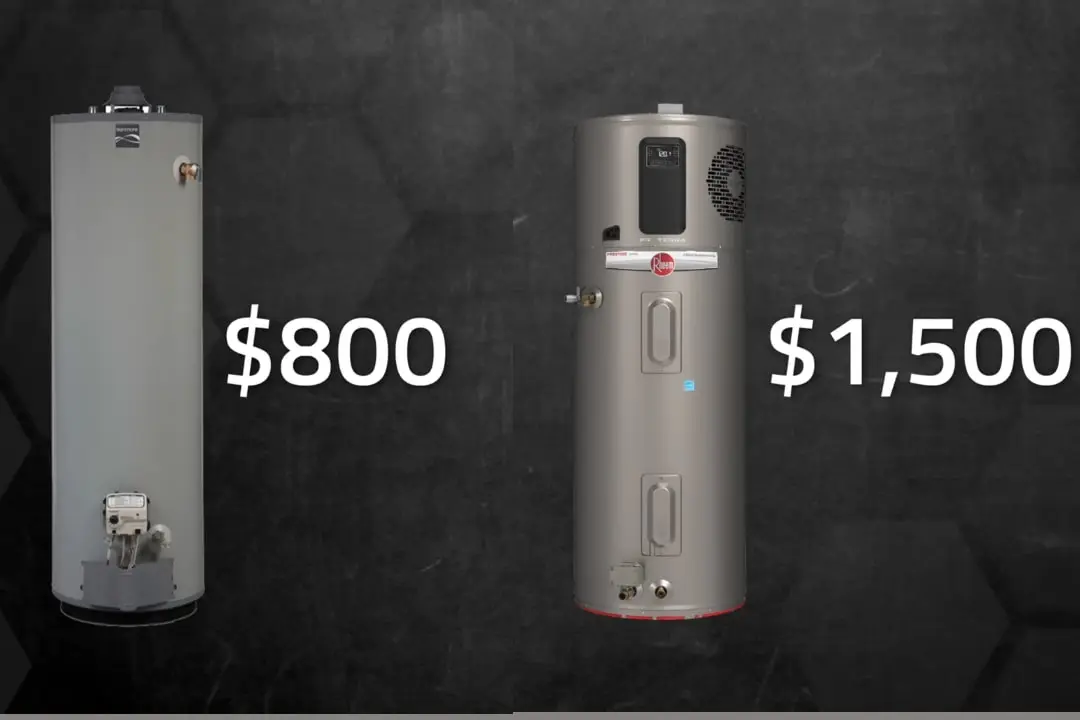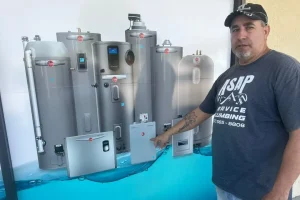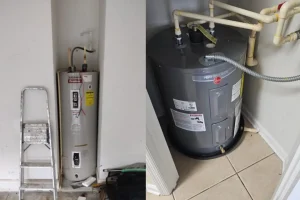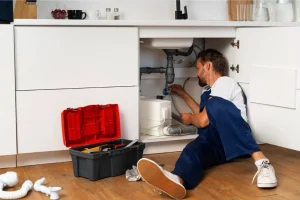As a resident of Orlando, are you tired of high energy bills and frequent water heater repairs? It’s time to consider upgrading to an energy-efficient model because it can revolutionize your home’s hot water system.
By utilizing advanced technology and innovative designs, these modern heaters offer significant benefits, from cost savings on energy bills to reduced environmental impact. With options like tankless, heat pump, solar, and condensing water heaters, there’s a solution tailored to your needs.
In this post, we will explore various types of water heaters and factors that can make replacing one more energy-efficient.
What is Meant by an Energy-Efficient Water Heater?
An energy-efficient water heater is a system designed to use less energy to heat water compared to traditional models. These heaters are built with advanced technology to minimize energy waste. This way, users can save money on utility bills.
They often feature improved insulation, efficient heating elements, and smart controls to optimize performance. By reducing energy consumption, energy-efficient water heaters also lessen environmental impact by lowering carbon emissions.
Overall, they offer a cost-effective and eco-friendly solution for heating water in homes.
Replace Your Old Water Heater with the Right Type
Your journey of water heater replacement in Orlando starts with selecting the most suitable water heater type for your home. So, check out the following options, and get an overall idea.
1. Tankless Water Heaters
Unlike traditional models that store hot water in a tank, tankless heaters heat water directly as it flows through the unit. This means you’ll never run out of hot water and save on energy costs because there’s no standby heat loss. Moreover, tankless heaters are more compact, saving valuable space in your home.
2. Heat Pump Water Heaters
These systems use electricity to move heat from the surrounding air into the water rather than generating heat directly. Using the surrounding heat, they can provide hot water using less energy than traditional electric heaters. With their energy savings and environmental benefits, heat pump water heaters are a smart choice for eco-conscious homeowners, who want to lower their utility bills.
3. Solar Water Heaters
They utilize solar collectors to absorb sunlight and heat water for your home. By tapping into renewable energy, solar water heaters can significantly reduce your reliance on traditional heating methods, cutting down on energy costs and carbon emissions. The long-term savings and environmental advantages make solar water heaters a sustainable choice for eco-friendly households.
4. Condensing Water Heaters
These units capture and reuse heat from exhaust gasses that would typically be wasted in traditional water heaters. With maximum heat transfer, condensing water heaters can achieve higher energy efficiency ratings, leading to lower utility bills. Their advanced technology and reduced environmental impact offer a smart and eco-friendly solution for heating water in your home.
Things that Will Make Your Replaced Water Heater More Energy-Efficient
Looking for effective solutions to get the most output after water heater installation? Well, the secrets are revealed here.
1. Adjust Thermostat Settings
Optimize your water heater’s energy efficiency by adjusting the thermostat settings. Lowering the temperature to around 120 degrees Fahrenheit can prevent excessive energy consumption while still providing hot water for your needs. Reducing the temperature will also decrease the risk of scalding and extend the lifespan of your heater by reducing wear and tear. This simple adjustment not only saves energy but also helps lower utility bills.
2. Optimal Water Heater Size
Ensure your water heater is the right size to maximize efficiency. Choosing a heater that matches your household’s hot water demands prevents unnecessary energy usage. An oversized heater will heat more water than needed, leading to wasted energy, while an undersized one may struggle to meet demand, resulting in frequent reheating cycles.
By selecting the optimal size based on factors like household size and usage patterns, you’ll minimize energy waste and save on utility costs. This thoughtful consideration ensures your water heater operates efficiently, meeting your hot water needs without excess energy consumption.
3. Sediment Maintenance
Regular sediment maintenance is crucial for maintaining water heater efficiency. Over time, sediments, like minerals and debris, can accumulate at the bottom of the tank. They reduce heating efficiency and potentially cause damage.
Flushing the tank annually removes built-up sediment, allowing the heater to operate more efficiently and extending its lifespan. Performing this simple maintenance task, you’ll ensure that your water heater continues to provide reliable hot water while minimizing energy consumption and preventing costly repairs.
4. Tank and Pipe Insulation
Enhance your water heater’s efficiency with tank and pipe insulation. Insulating hot water pipes reduces heat loss during storage and distribution. This means hot water stays hot longer, reducing the need for frequent reheating and saving energy. Insulation also helps prevent pipes from freezing in cold weather, ensuring consistent hot water delivery.
5. Timer Installation
Install a timer for your water heater to optimize energy usage. With a timer, you can schedule your heater to operate only when hot water is needed, such as during peak usage times. This prevents the heater from running unnecessarily, reducing energy consumption and lowering utility bills.
Additionally, timers allow you to take advantage of off-peak electricity rates, further increasing savings. Thus, you’ll have greater control over your water heater’s energy usage, improving efficiency and reducing costs.
Why Consider Energy-Efficient Solutions for Water Heater Replacement?
Let’s check out some beneficial points of replacing a water heater.
Cost Savings on Energy Bills
Switching to energy-efficient water heaters leads to significant cost savings on energy bills. These heaters consume less energy to heat water, resulting in lower monthly utility expenses. Over time, the savings can add up, making energy-efficient solutions a smart investment for homeowners of Orlando, looking to reduce their expenses.
Reduced Environmental Impact
Choosing an energy-efficient water heater helps reduce your environmental damage. These heaters consume less energy, resulting in lower carbon emissions and decreased dependency on fossil fuels.
Longer Lifespan of Equipment
Energy-efficient water heaters typically have a longer lifespan compared to traditional models. They also require fewer repairs and replacements over time. This means homeowners can enjoy reliable hot water for longer periods, saving money on maintenance costs.
Enhanced Home Comfort
These heaters also enhance home comfort by providing consistent and reliable hot water. With improved performance and efficiency, homeowners can enjoy a steady supply of hot water for bathing, cleaning, and other daily activities. This ensures a more comfortable living environment and improves overall satisfaction with home amenities.
FAQs
How much can I expect to save by switching to an energy-efficient water heater?
Switching to an energy-efficient (Energy Starr) water heater can save you up to $470 per year on your water heating expenses, depending on factors like the type of heater and your household’s hot water usage.
How do I know which type of energy-efficient water heater is best for my home?
Determining the best type of energy-efficient water heater for your home involves considering factors such as your hot water needs, available space, and budget. Consulting with a qualified technician or plumber can help you make an informed decision.
Can I install an energy-efficient water heater myself, or do I need to hire a professional?
While some homeowners may have the skills to install a water heater themselves, it’s generally recommended to hire a professional for proper installation. This ensures safety, efficiency, and compliance with any warranties or guarantees.
Conclusion
Adopting energy-efficient solutions for water heater replacement offers many benefits beyond cost savings. By upgrading to modern, eco-friendly options like tankless, heat pump, solar, or condensing water heaters, homeowners in Orlando, Kissimmee, and beyond can significantly reduce their environmental impact while enjoying longer-lasting equipment.
Moreover, implementing simple yet effective strategies such as adjusting thermostat settings, maintaining sediment levels, and installing timers can further enhance energy efficiency and prolong the lifespan of water heating systems.
Considering these points, investing in energy-efficient water heater replacements ensures financial savings, promotes sustainable living, and upgrades home comfort for years to come.




